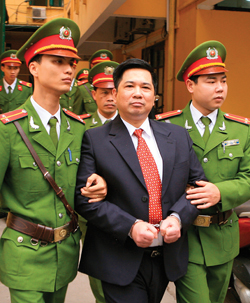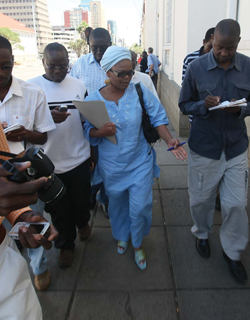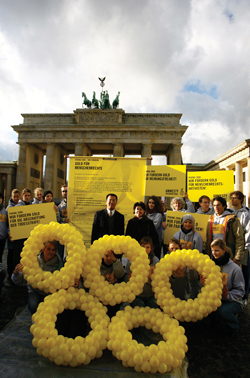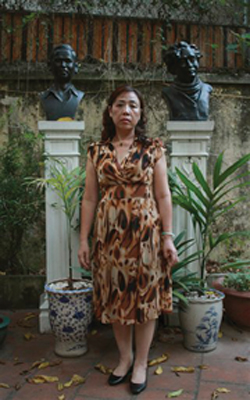The most dangerous job in law

Vietnamese human rights lawyer Cu Huy Ha Vu is escorted by police in April 2011 after being convicted of spreading propaganda against the state. He served three years of a seven-year sentence and was exiled to the United States. Reuters/Thong Nhat/Vietnam News Agency
Human rights lawyers had a different view of the man, whom they and human rights advocates around the world saw as a prisoner of conscience. Within the prison, he had earned the begrudging respect of his guards, to the point that some of them politely called him "doctor of law," while others called him "hero" or even "head of state."
For three years, Cu Huy Ha Vu had turned prison into yet another courtroom: winning better treatment for his fellow prisoners and assisting them in their legal struggles. Now, at last, he had won his own battle, though the victory came at no small price. When the guards escorted Vu out of the prison, they were ordered to take him directly to an airport. He was flown to the United States, whose diplomats had wangled an early release on medical grounds. It is unlikely he will ever set foot in Vietnam again.
"They forced me to go directly from prison to the airport, and from the airport to fly directly to the U.S.," Vu says. "They didn't let me visit my home, visit my sons, visit all my relatives. That is a kind of crime."
Exile may be wrenching, but it is far from the worst treatment Vu and his colleagues around the world have faced at the hands of antagonistic government authorities.
Some 200 lawyers and other activists are imprisoned in Vietnam alone, which, despite recent efforts to introduce liberalized economic policies and develop more contacts with the West, still is ruled by a Communist Party that maintains strict controls on political expression and resists calls for greater recognition of human rights. Vu was arrested for spreading anti-Vietnam propaganda; other attorneys have faced spurious charges of sedition, tax evasion and conducting subversive activities.
INTERNATIONAL ATTACKS
The persecution of human rights advocates is hardly unique to Vietnam. On May 7, longtime Pakistani human rights lawyer Rashid Rehman was shot to death in his office. Rehman had received death threats in open court on April 9 while rep-resenting a defendant charged under Pakistan's blasphemy laws. Human rights groups have campaigned against those laws, which carry a potential death penalty and often are used to persecute religious minorities or to settle personal scores.In the Philippines, at least 23 human rights lawyers have been killed since 2001, according to Lawyers for Lawyers, a Dutch foundation that seeks to promote the proper functioning of the rule of law by working for the freedom and independence of the legal profession. In Turkey, dozens of lawyers were beaten and arrested in 2013 when they joined in demonstrations against certain government policies and crackdowns on free assembly. In Russia, numerous criminal defense lawyers who sought to prove wrongdoing by law enforcement officials have received death threats, and several of those lawyers have been killed.
Indeed, few countries controlled by authoritarian regimes have not seen human rights lawyers being harassed, threatened, tortured and murdered.
During just a few weeks toward the end of 2014, police in Zimbabwe assaulted a lawyer monitoring a protest demonstration; three lawyers in Saudi Arabia were sentenced to five years in prison after calling for judicial independence; an Iranian lawyer recently released from prison had her license suspended without cause; and a human rights lawyer in Azerbaijan suffering ill health had his pretrial detention extended another four months.
Gail Davidson, founder of Lawyers' Rights Watch Canada, says that in the past year, attacks have been aimed at lawyers whose work threatens to do one or more of the following: (1) Expose serious government wrongdoing, including involvement in torture and extrajudicial killings; (2) interfere with government-approved commercial activities involving the use of land, including resource extraction and commercial development; (3) assert the rights of marginalized people to occupy and live on lands targeted for use by commercial actors; (4) promulgate information on international human rights; or (5) make public extralegal government crackdowns on freedom of expression, association and assembly.
The attacks have included everything from illegal surveillance to trumped-up charges and "failure to provide protection to lawyers threatened with harm," Davidson says. The reasons for these attacks are evident, she adds. "As to the importance of lawyers, the Colombian lawyers have a saying: ‘Sin abogados, no hay justicia.' " There is no justice without lawyers.
Persecution, harassment and physical attacks against human rights lawyers continue despite the efforts of advocacy groups and even the existence of international accords asserting the right of lawyers to go about their business free of improper government interference.
Chief among these accords are the Basic Principles on the Role of Lawyers (PDF), unanimously adopted in 1990 by the Eighth United Nations Congress on the Prevention of Crime and the Treatment of Offenders. Later that year, the principles were incorporated into a broader resolution on human rights that was adopted without a vote by the U.N. General Assembly. Although they are not legally binding, the principles underscore the vital role of lawyers and the obligation of governments to ensure that they are able to perform all of their professional functions.
The principles state that all people are entitled to call upon the assistance of a lawyer of their choice to represent them in criminal proceedings. The principles also assert that governments "shall ensure that lawyers (a) are able to perform all of their professional functions without intimidation, hindrance, harassment or improper interference; (b) are able to travel and to consult with their clients freely both within their own country and abroad; and (c) shall not suffer, or be threatened with, prosecution or administrative, economic or other sanctions for any action taken in accordance with recognized professional duties, standards and ethics."
But in the real world, those principles often are ignored. China, Vietnam and Zimbabwe all were U.N. member states when the principles were "welcomed" (in U.N. jargon) by the General Assembly. So, too, were Bahrain, Cambodia, Colombia, the Philippines, Saudi Arabia, Swaziland, Turkey and most of the dozens of other countries implicated each year in abuses against human rights lawyers.
"By advising and representing the victims of human rights violations and their relatives in criminal cases against the alleged perpetrators, [lawyers] help to combat impunity," says Kingsley Abbott, an international legal adviser at the International Commission of Jurists.
As a result, such lawyers become clear threats to governments that are characterized by impunity, corruption and political pressure. "Lawyers from all regions of the world face intimidation, interference, arrest and imprisonment or violence as a result of defending human rights," Abbott says. "The persecution of one or more lawyers through these means may, moreover, be used as a way to intimidate their peers."

Human rights lawyer Beatrice Mtetwa in 2008 outside the Harare High Court in Zimbabwe, where she applied for the release of foreign journalists who were jailed for working without accreditation. AP Photo/Mujahid Safodien-Star
THE WORK MUST BE DONE
While Vu was still imprisoned in Vietnam, another lawyer halfway around the world was facing the most recent in a long list of her own legal struggles.In November 2013, after nine months of a start-and-stop trial, Beatrice Mtetwa finally managed to have charges against her vacated by a court in Zimbabwe. In March of that year, the human rights attorney was imprisoned for eight days for obstructing the course of justice after demanding police produce a warrant for the raid of an opposition party office.
Mtetwa is a native of Swaziland, a small state surrounded almost entirely by the Republic of South Africa. She received her legal training at the University of Botswana, and has resided and practiced in Zimbabwe since 1983. Until the early 1990s, when she began defending human rights cases, she was known locally for her work as a prosecutor. But since then, her efforts supporting the rights of women and children, defending journalists (frequent targets of longtime President Robert Mugabe), and representing opposition politicians have gained her an international reputation.
"I have, of course, faced challenges here and there, as any acts meant to protect human rights are invariably interpreted as a fight against the state," Mtetwa says. "The challenges I have encountered include being physically assaulted by state agents, particularly the police, being arrested and prosecuted on trumped-up charges, having my pets poisoned."
In 2003, Mtetwa was detained on a spurious drunk driving allegation, beaten and choked. Four years later, she was beaten by police while taking part in a march by lawyers protesting the arrest of two colleagues. A 2009 U.S. diplomatic cable, published on anti-secrecy site WikiLeaks, gives a sense of the harassment she was undergoing at the time:
"Disturbingly, Mtetwa informed us that she also has become a target of the state," wrote James McGee, who was then the U.S. ambassador to Zimbabwe. "On March 11, she received a warning from a personal contact at police headquarters that the attorney general's office was considering ordering her arrest this weekend on charges of contempt of court. Mtetwa also mentioned that she was followed several nights ago by two unmarked Isuzu 4x4 trucks, which she suspected may have been driven by Central Intelligence Organization officers. She plans on avoiding her home this weekend."
At a program focusing on her work that was held in October 2013 during the annual conference of the International Bar Association in Boston, Mtetwa displayed a disarming modesty in describing what motivates her. "The work has to be done," she said. "I am very ordinary—my kids will tell you that. Some people think it's dangerous, but when you're working on a case, that's all you really focus on."
Mtetwa also urged lawyers to focus less on what she called "living the good life" and more on their public service obligations. "As lawyers, we need to give a little more to the societies in which we live," she said. "If we supported each other a little bit more, we'd get more people involved in the work."
OUTSIDER ATTITUDE
To that end, Mtetwa has resisted calls to enter politics. "It seems when you go into politics, you become like politicians," she says. "I want to fight whoever is in power if they violate human rights. Compromises of the rule of law have to be challenged right from the start. You have to be vigilant and challenge every little thing."Mtetwa embodies the attitudes of many lawyers who are challenging human rights violations around the world, says John H. Mathias Jr., a leader in the ABA Section of Litigation, which sponsors the International Human Rights Award. Mtetwa received the award in 2010. Among other recipients are Elena S. Ezhora of the Stichting Russian Justice Initiative in Moscow (2007); Salih Mahmoud Osman of the Sudan Organisation Against Torture (2006); Monice E. Magoke-Mjoja, founder of the Women's Legal Aid Centre in Tanzania (2003); and Cuban lawyer Leonel Morejon Almagro, who was chosen to receive the award in 1997 but was not able to travel to the United States to accept it until 2001.
One important characteristic of these and other human rights lawyers "is personal courage on a number of levels, but often a willingness to face personal danger," says Mathias, a partner at Jenner & Block in Chicago. They also are willing to take a pass on what Mtetwa called living the good life.
"What they're doing is service to others and working for the oppressed," Mathias says. In addition to their strong commitment to justice and the rule of law, "they believe that one person can make a difference."

Human rights activist Teng Biao (center) in 2008 at the Brandenburg Gate in Berlin, calling for progress on human rights in China. Reuters/Johannes Eisele
ACCEPTANCE OF RISKS
Those are the motives Chinese lawyer Teng Biao has taken to heart. "If you want to be a human rights activist," he says, "you must take all these risks and sacrifices."One of Asia's most prominent legal activists, Teng is responsible for helping to introduce the very concept of human rights to mainstream Chinese society. In just over a decade of practice, the Beijing attorney has seen growing civilian activism and increased calls for government accountability.
But as Teng puts it, he also has "paid the bills bit by bit." Teng has been disbarred, had his passport confiscated and found himself under surveillance. He has been detained and arrested on multiple occasions. He has been kidnapped more than once. In 2011, Chinese authorities abducted Teng, tortured him and held him in solitary confinement for 70 days without any outside contact.
"When I was kidnapped and detained and tortured, I was told that if I don't quit I will be put into prison [for] five years or 10 years," Teng says. "Their purpose was to get me to stop. But every time I was released I just felt I had to continue. I feel it is my responsibility to struggle for human rights. I can't stop, [although] my work becomes more and more dangerous."
Eventually, it became untenable for Teng to remain in China. Today, he is a visiting fellow in the Human Rights Program at Harvard Law School. But when interviewed in May, he was still residing in Hong Kong, in a state of limbo since leaving the mainland the previous October. His family was still there, and when asked whether he would go back, Teng responded soberly, "I don't know. I can go back now, but once I go back to China I will be arrested and charged with a political crime immediately."
With the prospect of prison on the one hand and self-exile on the other, Teng remains unsure about his future plans. "After my visiting role in the U.S., I'll take a look at what's happening in China," he says. "On the one hand, I hope to speak out for my colleagues, the detained human rights defenders. On the other hand, I also hope to struggle for human rights inside China."
For his part, Vu has become convinced that his fight is better taken on from the United States. Right now, he's conducting a study of his country's democracy movement, thanks to a National Endowment for Democracy fellowship in Washington, D.C., supported by funding from the Open Society Foundations. "From the U.S., I concentrate, from my heart, on liberating the Vietnamese people from the dictatorship of the Communist Party," Vu says, speaking through a translator. "And I think—I do not hope, I do think—that the Communist regime in Vietnam will fall undoubtedly in the very near future."
Coming from someone like Vu, such statements are not taken lightly by either government officials or advocates of reform.
During the interview with Vu in June, the ABA Journal translator went wide-eyed when she heard his last name. Vu's family line stretches back centuries, boasting numerous well-known figures in Vietnamese arts and politics. His father, Cu Huy Can, helped found Ho Chi Minh's government—he was a co-signer of the 1945 declaration of independence from French colonial rule and is one of Vietnam's most famous poets.
"In my family, always there was a spirit of law," Vu says. "My father and my uncle would talk always with me about justice, about mutual help between the people, and about struggle against injustice."
But today's Vietnam—where journalists, bloggers and ordinary citizens who dare to criticize the government are routinely rounded up and imprisoned—has not lived up to that vision.

Lawyer Nguyen Thi Duong Ha—the wife of Cu Huy Ha Vu—in the courtyard of her home in June 2013 while her husband enters the fourth week of a prison hunger strike. AP Photo/Mike Ives
Vu and his wife quickly became known for taking on the type of cases that would earn them powerful enemies. In 2005, he became the first person to sue authorities at the provincial level after battling officials in the coastal province of Thua Thien-Hue over plans to build a tourist resort on the lushly forested Vong Canh Hill, a protected site popular among tourists for its stunning vistas. The hill is located near a UNESCO World Heritage site.
Vu focused his attention increasingly on environmental and heritage law—a pursuit that put him at frequent loggerheads with the government. In response to his work, which included the defense of minorities and victims of land disputes, the government kept close tabs on Vu. He was pulled from government positions and became the target of smear campaigns. In 2009, he was fired from a position at the Ministry of Foreign Affairs in retaliation for a suit against the prime minister.
It was a pair of complaints in 2009 and 2010—lawsuits filed against Prime Minister Nguyen Tan Dung—that led to Vu's arrest in November 2010. Vu had accused the prime minister of illegally granting China a bauxite mining license and unfairly passing restrictions on complaints against the government. Both suits were referred to the Supreme People's Court, which refused to take them. But Vu was convicted of anti-state activity in 2011 and sentenced to seven years in prison. It was that sentence that brought him to Prison No. 5.

A Zimbabwean policeman struggles with protesters in March 2013 as they demonstrate against the continued detention of Beatrice Mtetwa, who was jailed for eight days for obstructing justice. AP Photo
SUCCESS IN SMALL DOSES
In their struggles against the power of entrenched governments, human rights lawyers often must measure their successes in small doses. But that can also make any sign of progress seem like a monumental achievement."The cases I'm extremely proud of involve ordinary people whose lives were transformed by my intervention," Mtetwa told the Journal. She managed to obtain damages for an elderly woman arrested for the petty theft of her daughter-in-law's watch. She helped widows and orphans "keep their homes in the face of greedy relatives who try to dispossess them." And she has successfully battled against police brutality and enforced disappearance. She also is a defender of journalists. "Among her court victories was the successful defense of New York Times reporter Barry Bearak and British freelance journalist Stephen Bevan, both of whom were arrested under an obsolete press accreditation law," noted the Committee to Protect Journalists when it gave her an International Press Freedom Award in 2005.
"The view I take is that if the laws guarantee certain minimum rights, it is my job to use those laws to protect my clients' rights, and it has always been a source of great surprise and frustration that politicians try to criminalize my work," Mtetwa says.
In China, Teng has managed to have death sentences against some clients dropped, while others have even been released from prison. But sometimes, he says, success must be measured in other ways. "Sometimes, yes, we feel frustrated when we are not given justice; but we are still optimistic because even if we lost any cases, our work—our effort—is not meaningless," he says. "Because during our participation in these cases, we have let more and more people know about the corruption in the judicial system and political system, and we have made people get more and more awareness of their human rights."
Teng's modesty is evident. His cases, however, often have had far-reaching impact. In 2003, one of the first cases he took on after receiving his PhD from Peking University was a challenge against the constitutionality of regulations governing migrants. The complaint arose when an internal migrant—who had moved from his home province in search of work elsewhere—was beaten to death after being taken into custody for failing to carry a temporary resident permit. Under pressure from Teng and two other young lawyers, the government's administrative cabinet, known as the state council, agreed to strike down the regulations, replacing them with new and slightly more lenient measures.
In the following years, Teng and his colleagues launched a series of human rights movements, capitalizing on changing perceptions of the government while putting themselves ever closer to the line of fire. "We didn't have a great connection with the government after that," he says. "We continued our human rights work after that, but we were considered gradually as troublemakers."
As the work gained traction—aided by the Internet and growing public awareness—more and more activists who had fought for human rights alongside Teng were arrested. "The central government cracked down on the civil society and the human rights movement very, very severely," he says. "Nearly 300 human rights defenders have been detained and sent to prison since the spring of 2013," he told the Journal in May 2014.
But as is typical for lawyers like him, Teng is loath to back off. "I'm intellectual, I'm a lawyer, so I feel like I should take on more responsibility than the people who are the victims of this authoritarian regime," he says. "It's an important time for China now. I have to play my part in the transformation for the next generation."
This article originally appeared in the February 2015 issue of the ABA Journal with this headline: "The most dangerous job in law: In many countries, human rights lawyers put their lives on the line when they take a case."
Updated April 20, 2016, to correct a style error.
Correction
Updated on February 26 to correct the source of funding for Cu Huy Ha Vu’s National Endowment for Democracy fellowship. It is funded by the Open Society Foundations.Abby Seiff is an American journalist based in Phnom Penh, Cambodia.
Write a letter to the editor, share a story tip or update, or report an error.


